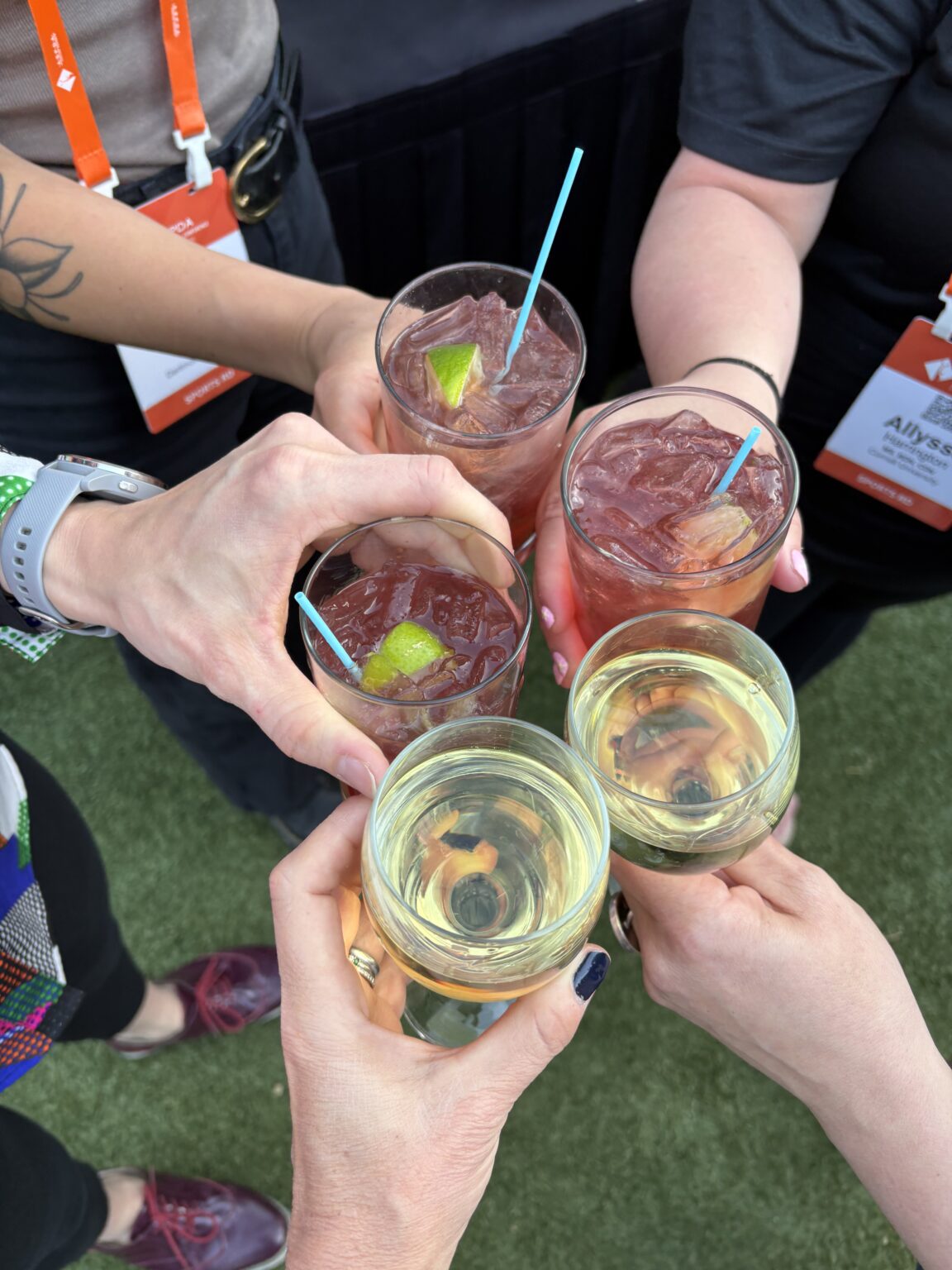Amy Stephens
MS, RDN, CSSD, CEDS
Licensed dietitian
specializing in sports nutrition
and eating disorders
MS, RDN, CSSD, CEDS
Licensed dietitian
specializing in sports nutrition
and eating disorders
This blog is about providing athletes with research-backed information so they can make informed, self-aware decisions about how much they drink and alcohol’s impact on overall health and performance. This isn’t a judgment about alcohol consumption or abstinence. Rather, it is a means of educating athletes so that they know how alcohol impacts their body and performance.
For athletes, especially those competing at a high level, every choice that affects the body matters. Training load, sleep habits, nutrition, and recovery practices all contribute to performance. Alcohol consumption is another important variable that impacts the body.
Alcohol has wide-ranging effects on the brain, metabolism, hormones, recovery systems, and the gut—areas that directly influence how an athlete feels and performs. Understanding these impacts helps athletes tune into their own body’s signals and then choose what supports their goals.
Alcohol and Exercise: Why It Matters More for Athletes
Alcohol (ethanol) is both water-soluble and fat-soluble, meaning it passes easily into almost every cell in the body: brain tissue, muscle, liver, and gut. Once consumed, the body prioritizes breaking down ethanol because it is treated as a toxin, not a nutrient. This creates two issues for athletes:

Alcohol affects metabolism:
When alcohol is ingested, the liver prioritizes ethanol over other important metabolic functions like breaking down fat or carbohydrates for energy or repairing muscle. While this is happening:
Alcohol has a positive dose-response relationship on the body, which means, the greater the amount of alcohol is consumed, the greater the impact it has on overall health, recovery and performance.
This is why drinking, even small amounts, can impair recovery from the previous day’s workout. The recovery process is delayed as vital nutrients for muscle repair and energy storage are deprioritized. The more alcohol consumed, the longer it takes to break it down and the longer recovery is delayed.
Alcohol is “empty calories”:
Alcohol contains 7 kcal per gram with no vitamins, minerals, or nutrients. When the body uses alcohol as an energy source, the excess glucose and fat you consume from food are more likely to be stored as adipose tissue. You don’t feel differently when this is happening. Your body doesn’t provide any feedback to let you know that alcohol is being stored as fat. This is important because we don’t think about alcohol as a “fatty food” but yet it’s promoting fat tissue.
For athletes concerned about maintaining lean muscle or optimizing power-to-weight ratio for competition, this matters for competition, storing extra fat will change body composition in a way that may impact performance.

Alcohol’s Effect on Appetite and Eating:
Alcohol can increase appetite and impair satiety signaling. Research (Cains, 2017) shows that alcohol consumption activates brain areas linked to heightened hunger—even when the body has plenty of calories This can be linked to ethanol being metabolized first which the body feels as if it’s being starved. Even if food is consumed, the priority is to break down alcohol rather than generate energy. This can lead to:
Hormonal Effects: Cortisol, Stress, and Mood:
Alcohol impacts the hypothalamic-pituitary-adrenal (HPA) axis, which regulates stress and the stress hormone cortisol (Badrick, 2007).
Key findings from this study:
Impact of alcohol on serotonin
Alcohol causes a temporary spike in serotonin, which can make you feel relaxed or more social at first. But as the alcohol wears off, serotonin levels drop below normal, leading to low mood, anxiety, and irritability. With repeated drinking, the brain reduces its serotonin receptors and natural production, making it harder to regulate mood without alcohol. Alcohol also raises cortisol, which further suppresses serotonin, and it disrupts the gut microbiome—where most serotonin is made. Over time, this creates a cycle of more stress when not drinking, lower mood overall, and stronger cravings to drink again for relief.
Athletes often describe “hangxiety”—the anxiety and low mood after drinking. This is rooted in real physiology:
This can create a cycle where drinking initially boosts mood but leads to deeper dips later. This leads to a pattern that encourages drinking more to achieve that same initial feeling.
Alcohol: Gut Microbiome Disruption
Alcohol disrupts the gut microbiome by killing beneficial bacteria, allowing harmful microbes to overgrow, and reducing microbial diversity. This imbalance disrupts the intestinal barrier by lowering butyrate, an essential by-product of fiber digestion. This undermines gut lining integrity, leading to a “leaky gut” where toxins escape into the bloodstream. These toxins trigger generalized inflammation, which can affect the whole body. Inflammation is a necessary component of exercise and the gut plays an essential role in helping the body decrease inflammation. Alcohol metabolism also produces toxic byproducts that further damage the gut lining and amplify inflammation (Gupta, 2021).
Effects include:
Research linking gut health to brain and liver function demonstrates how alcohol can disrupt this gut–brain–liver axis.
For athletes, a disturbed microbiome may mean:
Sleep: Impact on the REM cycle
Alcohol doesn’t help you sleep; it sedates and interferes with sleep quality. Dr. Matthew Walker (sleep expert at UC Berkeley) explains that alcohol initially induces a sedative effect that leads to falling sleep. However this sedation disrupts natural sleep patterns, and suppresses REM sleep. Because REM is essential for emotional stability, memory, and cognitive function, losing it leads to poorer mood, impaired learning, and increased anxiety the next day. Alcohol also activates the body’s fight-or-flight system, making sleep lighter, more fragmented, and far less restorative.
Alcohol causes:
Poor sleep is one of the strongest predictors of reduced performance, injury risk, and impaired recovery. This can be even more impactful to athletes that struggle with sleep on a regular day.
Dr. Matthew Walker emphasizes that alcohol is one of the most significant disruptors of quality sleep.
Alcohol’s Impact on Recovery and Muscle Repair
Recovery is where fitness adaptations actually happen. Alcohol interferes with multiple recovery pathways:
Research shows alcohol can blunt muscle protein synthesis, which is essential for:
One study (Parr, 2014) found that consuming protein + carbohydrate after drinking improved muscle recovery more than drinking alone, but recovery was still inferior compared to a true sober recovery meal.
Shaw et al. (2020) demonstrated that alcohol consumption the night before high-intensity exercise reduces muscle function and performance.
Why Hangovers Happen (and Why They’re So Bad for Athletes)
A hangover is a combination of:
Certain drinks contain more congeners (nitrites and chemical byproducts of fermentation), which worsen hangovers:
If you choose to drink, hydration strategies matter:
Drink 1–2 glasses of fluids with electrolytes.
This helps restore hydration and electrolyte balance.
How Bad Is Alcohol? Should Athletes Exclude Alcohol?
There is no one-size-fits-all answer. The goal is to understand the impact on the body and make informed decisions.
A question you can be asking yourself, “Is this drink worth the trade-off for you and your goals right now?” Keep in mind that the more alcohol you consume, the greater impact on the body.
Practical Guidelines for Athletes Who Choose to Drink
1. Hydrate with at least 1–2 glasses of water with electrolytes per drink.
2. Avoid drinking close to training or competition. Allow at least 24–36 hours before important workouts or matches.
3. Add protein and carbs afterward. This supports muscle repair and reduces performance losses.
4. Stick to low-congener drinks to minimize hangovers. Clear spirits > beer > whiskey/brandy.
5. Focus on your sleep. Stop drinking 3–4 hours before bed.
6. Know your patterns. If drinking is tied to reducing stress, anxiety, or worsening mood swings, you may want to explore your relationship with alcohol.
Conclusion
For athletes, the question isn’t about judgment. It’s about asking yourself these questions:
Does drinking support or undermine your goals?
What is the impact of alcohol on your body?
Your body gives you information and feedback.
Your job as an athlete is to listen and make the best decisions for you and your body.
Additional Support
If you feel that you are struggling with alcohol, here are resources that can help:
Alcoholics Anonymous (AA)
Find local meetings: aa.org
SAMHSA National Helpline (U.S.)
1-800-662-HELP (4357)
You can also reach out to your healthcare provider, family, coach or friends for support.
References
Badrick E, Bobak M, Britton A, Kirschbaum C, Marmot M, Kumari M. The relationship between alcohol consumption and cortisol secretion in an aging cohort. J Clin Endocrinol Metab. 2008 Mar;93(3):750-7. doi: 10.1210/jc.2007-0737. Epub 2007 Dec 11. PMID: 18073316; PMCID: PMC2266962.
Cains, S., Blomeley, C., Kollo, M., Rácz, R., & Burdakov, D. (2017). Agrp neuron activity is required for alcohol-induced overeating. Nature Communications, 8, 14014. DOI: 10.1038/ncomms14014
Gupta H, Suk KT, Kim DJ. Gut Microbiota at the Intersection of Alcohol, Brain, and the Liver. Journal of Clinical Medicine. 2021; 10(3):541. https://doi.org/10.3390/jcm10030541
Parr, EB,, Camera, DM, Areta, JL, Burke, LM, Phillips SM, Hawley, JA, & Coffey, VG. (2014). Alcohol Ingestion Impairs Maximal Post-Exercise Rates of Myofibrillar Protein Synthesis following a Single Bout of Concurrent Training. Plos one. https://doi.org/10.1371/journal.pone.0088384
Shaw, A. G., Chae, S., Levitt, D. E., Nicholson, J. L., Vingren, J. L., & Hill, D. W. (2022). Effect of Previous-Day Alcohol Ingestion on Muscle Function and Performance of Severe-Intensity Exercise. International Journal of Sports Physiology and Performance, 17(1), 44-49. Retrieved Nov 15, 2025, from https://doi.org/10.1123/ijspp.2020-0790
Spencer RL, Hutchison KE. Alcohol, aging, and the stress response. Alcohol Res Health. 1999;23(4):272-83. PMID: 10890824; PMCID: PMC6760387.
Walker, M. (2024, June). How alcohol kills your sleep quality [Video]. YouTube. https://youtu.be/oNMRXt445w8